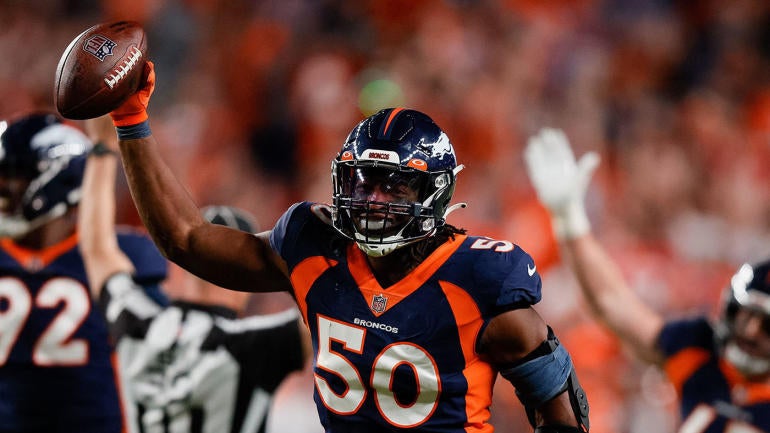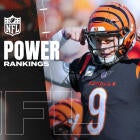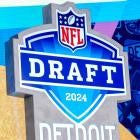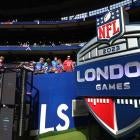
When the Broncos edged the 49ers in Sunday night's Week 3 defensive battle to claim an 11-10 victory, they became just the second team in NFL history to win a game with that final score. But there is evidence to suggest Sunday's matchup actually should've been the very first instance of an 11-10 final. It dates to 2008, when the Steelers beat the Chargers with the same score ... but only after a last-second touchdown was wrongly nixed by a penalty against San Diego.
That season, in Week 11 (go figure), the Steelers led the Chargers 11-10 with five seconds remaining. Philip Rivers took a shotgun snap as the Chargers quarterback, with time for one more play from San Diego's own 20-yard line. He completed a short throw to running back LaDainian Tomlinson with three seconds left, and as the clock winded toward zero, Tomlinson proceeded to pitch the ball to wide receiver Chris Chambers, who juked around before trying his own lateral back to Rivers.
Chambers' lateral, which went skyward, was deflected midair by Steelers safety Troy Polamalu, who then scooped up the live ball and outran wideout Malcom Floyd to score a defensive touchdown. The score made it 17-10, in favor of the Steelers, before the extra point. But that's when the officiating crew came in to steal -- and rewrite -- the show. Despite the fumble recovery originally standing as a touchdown, a replay subsequently overturned the call on the field, with the official claiming an illegal forward pass had occurred and, thus, by rule, rendered the play dead upon said pass.
If tonight's score is the final, it'll be the second 11-10 game in NFL history. It *should* be the first because the refs robbed Troy Polamalu of this fumble return/touchdown against the Chargers in 2008. #Steelers pic.twitter.com/7yNHWiv86t
— Alex Kozora (@Alex_Kozora) September 26, 2022
The final TD was promptly erased, and the Steelers instead won 11-10. Pittsburgh had little reason to complain, as the team improved to 7-3 under Mike Tomlin, then in just his second season as coach, and went on to win Super Bowl XLIII.
But nowhere in archived video of Polamalu's scoop and score -- and the laterals that preceded it -- is it clear that an illegal forward pass was thrown during the play. Tomlinson tosses the ball behind his back to Chambers after catching Rivers' initial throw, and Chambers' toss, from about the 27-yard line, clearly travels backward and gets knocked out of the air by Polamalu at roughly the 23-yard line. The first lateral isn't as obvious as the second, but the ball never moves up field and is never even thrown in a forward direction.
Turns out, the penalty should never have been issued. The NFL -- and specifically referee Scott Green -- admitted after the game that Polamalu and the Steelers should've been given credit for the score, and that the rule had been "misinterpreted." But get this: they still ruled that an illegal forward pass had occurred, between Tomlinson and Chambers; it's just that it hadn't hit the ground, so play was able to continue.
There were three passes on the play. The first was a completed forward pass from San Diego's Philip Rivers to LaDainian Tomlinson. The second, from Tomlinson to Chris Chambers, was initially ruled a legal backward pass but then reversed in replay to an illegal forward pass. The third, from Chambers, was a legal backward pass that hit the ground and was returned for the touchdown by Pittsburgh's Polamalu. ...
If any forward pass, legal or illegal, hits the ground, the play is dead immediately. The officiating crew mistakenly determined that the backward pass that Polamalu legally recovered and returned for the touchdown was the pass that was reversed in replay to being forward and illegal. Therefore, the crew ruled that the ball was dead when it hit the ground and the play was over. (The actual illegal forward pass -- Tomlinson to Chambers -- did not hit the ground and therefore the play is allowed to continue.) ...
If the situation had been handled properly, the defense (Pittsburgh) would have declined the penalty for an illegal forward pass from Tomlinson to Chambers and taken the touchdown.
So next time you talk 11-10 NFL scoring trivia, go right ahead and throw an asterisk on the Steelers-Chargers game as the first to ever post such a final. The Broncos and 49ers, meanwhile, can rest even more comfortably knowing they -- unofficially but authentically -- were the first to ever finish an NFL game with 11-10 up on the scoreboard.






















